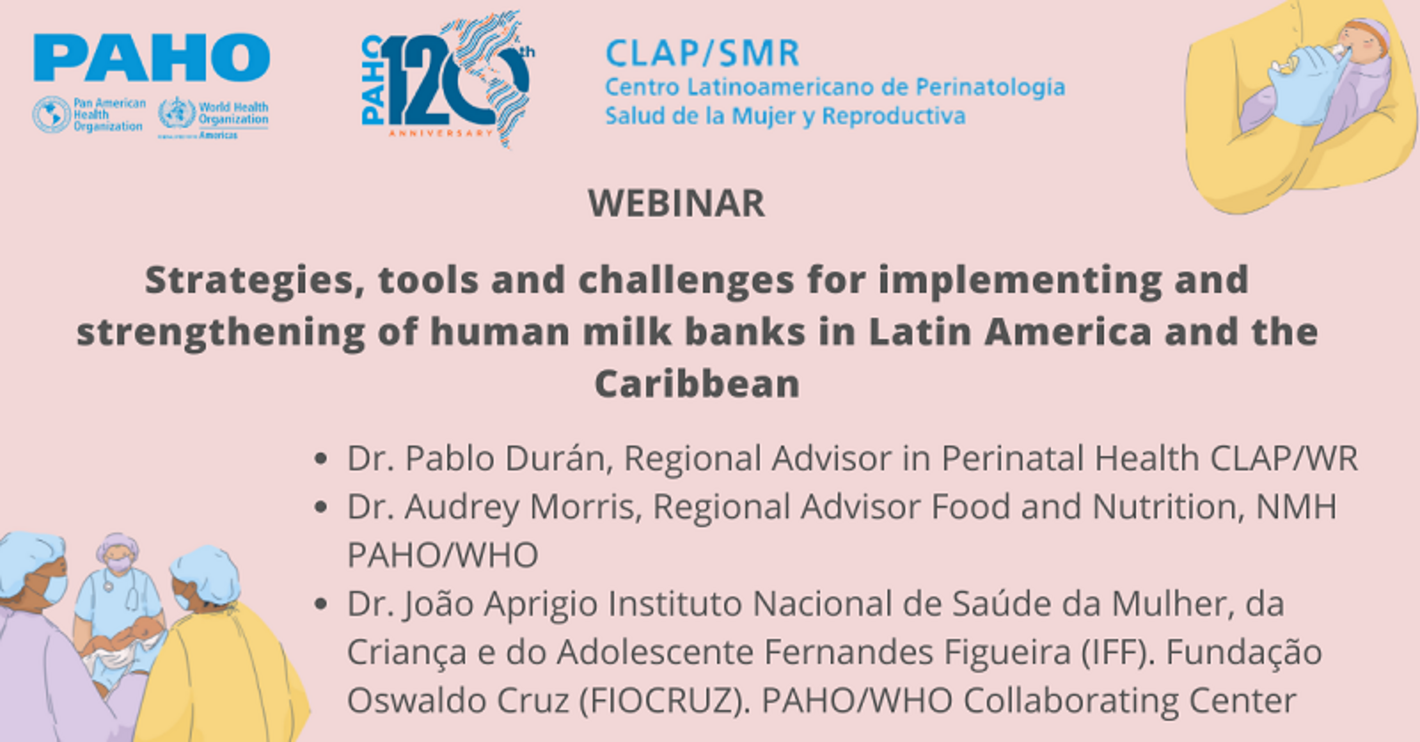
Montevideo. September 1,2022. On August 30th, more than 300 people attended the webinar Strategies, tools and challenges for the implementation and strengthening of human milk banks in Latin America and the Caribbean.
During the opening, Dr. Suzanne Serruya, Director of the Latin American Center for Perinatology - Women and Reproductive Health (CLAP/WR) of the Pan American Health Organization (PAHO/WHO), said that "the topic of this seminar is essential because it has to do with how to improve the nutrition and development of newborns".
Dr. Serruya mentioned that 2030 is not far away and there are still many challenges to meet the commitments made by countries in the framework of the Sustainable Development Goals (SDGs). On this point, she pointed out that the issue of human milk banks is linked to SDG 2 "Hunger 0" and SDG 3, which has to do with health and among other things, covers the need to reduce newborn mortality.
The Director of CLAP/WR reaffirmed the institution's commitment to work with countries on this issue. In this regard, she stressed the importance of human resources training, communication and the dissemination of evidence-based information.
Finally, she said that this seminar is an "opportunity to discuss the challenges and how to move towards sustainable and fair development.
Dr. Pablo Durán, Regional Advisor on Neonatal Health for CLAP/WR, recalled that the event is taking place within the framework of the Breastfeeding Month and thanked the participation and collaboration of the PAHO/WHO Nutrition Unit, as well as the Fernandes Figueira Institute which is a PAHO/WHO Collaborating Center for this topic.
Moreover, he referred to how the COVID 19 pandemic also impacted the possibilities of nutrition and development of newborns and urged to continue working to strengthen breastfeeding with human milk as a way to promote the care, nutrition and development of infants.
Exclusive breastfeeding is one of the most effective interventions to ensure that newborns survive and thrive. Human milk offers newborns essential nutrients, protects them against infections and promotes optimal physical and cognitive development.
Among the specific interventions aimed at promoting and favoring breastfeeding, human milk banks represent a relevant strategy, particularly in situations where breastfeeding is not possible.
In this context, Dr. Audrey Morris, PAHO/WHO Regional Advisor for Food and Nutrition, referred to the challenges for the successful initiation of exclusive breastfeeding in Latin America and the Caribbean.
In this regard, she referred to studies that show the positive impact of breastfeeding with human milk in the first 24 hours to reduce infant morbidity and mortality. She also pointed out some existing barriers, among which she mentioned: institutions that continue with old practices, such as separating the mother from the newborn in the first hours; lack of knowledge about how to address the issue after a cesarean section; feeding through human milk substitutes during the first hours; and lack of training of personnel attending births.
Dr. Morris also highlighted "The 10 steps to breastfeeding". She referred especially to the need to promote exclusive breastfeeding and the importance of continuous counseling and support, both from health centers and from family and community settings. "A multidimensional approach, as well as political will and leadership are needed from the Ministries of Health to promote policies that promote breastfeeding with human milk," she said.
Finally, she referred to the need for sick, small, or premature children to be fed with human milk and, in this regard, stressed the importance of having human milk banks that follow established standards and procedures and facilitate breastfeeding in a sustainable way.
Dr. João Aprigio, from the PAHO/WHO Collaborating Center Fernandes Figueira Institute, underscored the importance of generating this type of event to discuss the topic, which "is also closely linked to SDG 17, which refers to strategic alliances to achieve the goals.
He stated that the human milk banks in the region have proven to be a successful experience with very positive results and highlighted the networking. In relation to this, Dr. Aprigio highlighted the articulating role of PAHO through CLAP/SMR.
During his presentation, he referred to 4 strategic objectives: to expand and share knowledge of technologies for the establishment, implementation and management of human milk banks; to make technical data and scientific evidence available for their development; to develop surveillance, monitoring and evaluation tools; and to develop professional training activities.
"We must guarantee access to human milk as a fundamental right," he concluded.



